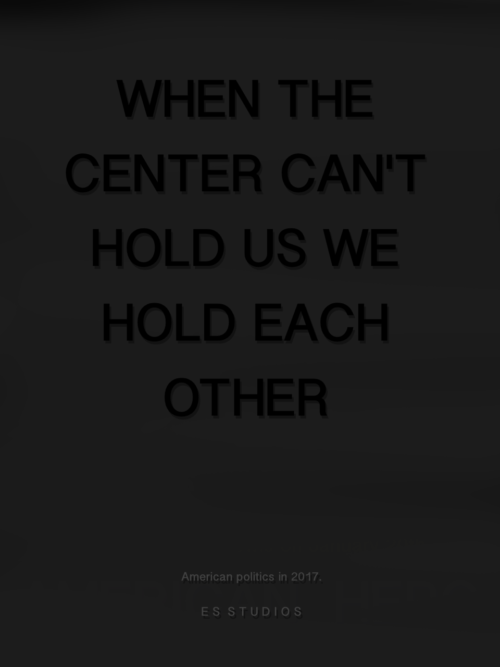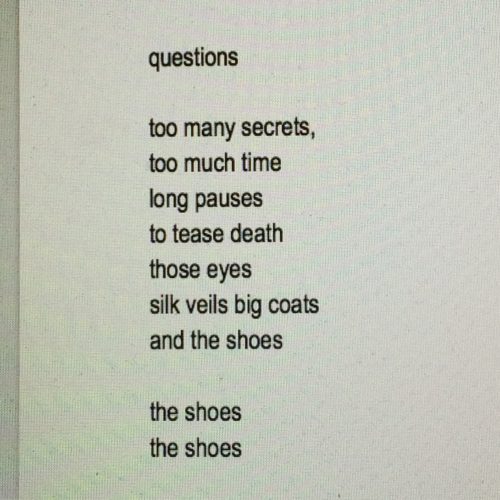Retreat Left

This is going to be long. I will discuss politics in the dangerous context of business and try to compare Seattle and New York, but I will go astray. You’re warned. I spent a long time to fix the structure of this essay. This first bit is about my vocation and leads into a bit about leaving New York. I think I wanted to give the political parts a level of context. It’s hard to read about politics if you don’t know what it comes out of.
In January I was offered a 2-month contract with a large electronics company based in New Jersey. I had been freelancing for nearly a year in New York City, after spending five years as copywriter at an agency in Manhattan. I left that agency after they overbid a contract and lost a multi-million dollar / year business (our management felt the account was unprofitable). Most of my team of thirty (creatives, strategy, account, project management) were let go in the following months; the large piece of retail-focused advertising business moved to an agency out-of-state.
For a year I’ve been jumping between little digitally-focused ad shops. Learning new stuff, meeting new people. I spent the majority of my year looking for work and reading.
Freelancing isn’t the glamorous, independent life people alluded to in business school. It certainly doesn’t pay for business school. When younger people talk about freelancing it seems like they assume freelancers exist in a harmonious bubble outside of the regular business culture. Not so. We’re all in the same barn. First of all, most companies don’t want to pay the kind of freelance wages they paid a decade ago, to employees with commensurate level of (senior) experience. It was normal to bill $1000/day for senior creative freelance before the Great Recession. That number is now closer to $650 (according to an anonymous discussion on Agency Spy), but with the added caveat that contracts (if you have a contract) are much shorter, often limited to understaffed late-night sprints to critical early-morning client presentations. It’s a week, maybe two of intensive work that nets a few thousand dollars and serious tax implications.
To be successful, one needs to keep the jobs coming in at an exhausting rate, each time learning a new office culture, figuring out the role, guessing about when a check might come in, saving thousands for taxes. The general awkwardness of being an outsider on the inside of an organization can be the most confusing part. Sometimes you’ll get yelled at for not being a team player, despite the fact that nobody ever asked you to join the team.
It’s a good deal for me. It’s nice to have variety and a modicum of respect that must necessarily go with variety.But I think, in general, ad agency freelancing has become unstable, seasonal work. As ever, the vast majority of big hiring choices (freelance, full time, and the largely-mythical “temp-to-perm”) are made based on office politics, personal relationships, or very narrowly-defined LinkedIn skills / experience (vs. broadly proven merit). One agency told me, after a month of freelancing, that they had concluded that they didn’t actually need a writer of my high caliber at this time.
I know what you’re thinking while reading this. High caliber… seems… overstated? I’ll never know what really happened, I guess. I certainly failed to make myself indispensable. I’m not sure it matters.
This is the way the game is played. As the labor market continues to fixate on hiring a few critical VP roles in ops, intel, and engineering (product owners, in tech office speak), systemic exclusion from the best remaining positions becomes a journey through all things granular and petty. A talented person might be algorithmically denied work because they haven’t worked for a soda brand, even though they have worked for a sugary juice brand, for example. A person with extensive social media experience might not be the best fit for a brand looking to produce email marketing, despite the fact that the fundamental skill set is the same, CRM (consumer relationship management or what the data-based junk mail business has become in the digital age). The intense level of scrutiny required to be hired by a company is laughable in the political context of the Trump administration. What does a complex, secretive hiring process accomplish? What message does it send? I think this can apply to all industries. Candidates should be judged by their professionalism (honesty, calm, kindness, ability to listen) and the intelligence of their work. Why is anything else relevant? Any yet, companies think more data is going to help them, somehow.
If you’re in the industry, and not a white guy with a cabinet full of industry awards, you already know all this. The industry leadership is mostly white guys with cabinets full of trophies.
I haven’t won any awards. Thank goodness.

erikstinson.com > web log
***
Back to the middle. In January, upon hearing about a medium-length ad job with a terrible commute, I signed. The gig is decent; the management is fair; the pay is fair. I’m getting to know NJ public transit.
But it was almost that same day–the day that I accepted the NJ gig–that I decided to finally make my retreat. Back to the West Coast. Back to my family. Back to hardcore left-wing politics. Back to the provincial residue of frontierism, mercantilism, colony, post-empire, indian reservations, casios, ports, timber, mountains, software, salmon, industrial aviation, coffee, Canada.
I’m mostly packed up. I’m putting my stuff in boxes and I’m getting a subletter for my room in Bushwick.
Somebody asked me if the administration of the 45th president had anything to do with my choice to hang my hat a little closer to family and the Space Needle. I said no.

Instagram @sacred_ux
There are personal reasons for a move, most prominent among them is that I’ve lived in New York for too long, seven years. I’m not getting any younger, richer, or cooler. I own a nice computer (a business expense), a few rare books and a lot of designer work-clothes I bought on eBay. That’s it. The only things keeping me in New York are my friendships.
I grew up in Seattle. I went to university in Seattle. I don’t know many people in Seattle these days. Most of my friends have moved to LA or New York. A few high school friends remain. A few people I remember from the music scene.
I commuted into the city for concerts starting in my teens, driving in from the eastern edge of the Bellevue School District. The town has changed in the near-decade (I also lived in Oakland for a year) since I’ve lived there? I’m thinking it has. It appears Amazon has taken over the skyline. Public transit is finally happening in a serious way, with mixed success? Many of the bars I loved going to in college have closed. A few remain.
But I’m not going back to Seattle sit in bars. That’s probably more like the final outcome, in another decade or two from now, if I’m lucky.
The right way to look at this move is probably that I’m going back to try to refresh my perspective. It presents a chance to make large changes. These are aphorisms.
***
For being an industry that constantly touts its cultural capital, advertising remains politically conservative, perhaps deceptively so. During the numerous protest movements that New York City has seen in the last few years, it was extremely rare to hear anyone at work discuss political dissent, let alone see them out in the streets. Occupy, Black Lives Matter, the Women’s March, #NoBanNoWallNoRaids were not significant topics of conversation at any agency I’ve worked at, despite their undeniable political import. It should change. I went to four protests during the first couple weeks of the 45th presidential administration. Does this begin to mean something, does it make a difference? That’s same number I went to during a full year living in Oakland. Did that make a difference?
I always see Oakland as the sacred and immutable home of radical-left politics in Northern California, if not nationally. It’s a place where the political fortunes of the whole country have expressed themselves in extremes. It was end point of the first Transcontinental railroad. It’s now a rapidly changing place, with history richer than many will take the time to understand.
RIP Oscar Grant. Also, s/o to the Berkeley Grad Student Union; thank you for letting me help out. It was a continuing education.
I want to say the business world is dangerously late when it comes to politics. In advertising, most senior people eventually realize what’s going on, after political leaders have done their worst. I mean this internally and externally to agencies. Inside it’s a honey-slow kind of politics. After the companies pay out bonuses to their retiring vice presidents, the truth squeezes to the trade press in painful waves. I read every kind of industry political dirt, from COOs cheating on social metrics to messy sex scandals to shameful comments on race from senior leadership.
I will say that general grumbling about Trump is (finally) common at the two places I’ve worked most recently. Still, we could do better as a department, an industry, a generation. We’re the ones who speak for corporations; why wouldn’t we also speak for their customers? It’s all the same economy, ultimately. People without much money tend to buy more stuff from public corporations than the ultra-rich, who write most of the bills in DC.

From an unpublished collection called Adult Contemporary
As someone who was riveted by Seattle’s WTO protests–totally glued to the TV at a tender age–I can’t imagine life without some political intrigue, especially for anyone who has chosen to work in the media. It’s so easy to have an informed opinion, so easy to vote down a bad candidate or very slightly change purchasing behavior to reflect political intentions. But that’s not what I’ve seen for the past seven years.
My exposure to the eastern bloc of the American left has been mixed. When I worked the Occupy Wall Street media team, I was disappointed by the impractical posturing. The sincere call to abolish all currency stands out. I remember talking to people, realizing we were probably all under NYPD surveillance, and thinking we’re not saying anything remotely dangerous or threatening to the status quo on Wall Street. The grassroots became… stuck in the weeds, shall we say. Our contacts at the DNC were totally neglected. Many Occupy participants wanted dramatic change without specific policy demands, without political coalitions, platform dealmaking, collective bargaining, or representatives of any kind. To me it wasn’t functioning politics, it was pure ideology with a bit of architectural theory. Totally impractical, no matter how impassioned. Easy for the powerful to ignore. Toothless. Crushed in one night by the police crowd control unit and the air-space-enforced media blackout. My OWS story ends like everyone else’s. Silence.
And where are we going to put our money, if not in banks? I have a credit union, but do know the purpose it serves? It’s my bank. And what does break up the banks even mean, from a policy standpoint? Though I am a strong supporter of socialist policies, I don’t see banks as institutions to be sidelined, either rhetorically or institutionally. What do liberals want from banks? Robust financial regulation? Which type? Which bankers will you ally with to make sure it actually happens? How do we pragmatically make the changes we want without sounding like we’re going to end capitalism as we know it?
The (hard?) truth is that nobody in the political center wants to end capitalism. They can’t imagine what that would look like. It sounds as ridiculous as “repeal and replace.” And to that point, single-payer healthcare really is on the line–at least as much as financial regulation, or viable plans to lessen inequality. We could do that, as a political generation, if we fought harder. The environment is on the line, obviously. Our traditionally sensible immigration policies–the beating heart of our economy and shining example of our democratic principals–are on the line. I mean if the USA doesn’t do a good job with taking care of our own citizens, at least we can invite people to live here and fix all the problems we created! Is this not deeply centrist and reasonable?
NYC has shaken my faith in the left. I knew it would. The class system here is brittle, rigid, perhaps more so on the left side of the isle, because of the way progressive rhetoric can seal off whole classes of people from political reality. In NYC, the types of rich people are too numerous to count, even on the left. Old money is older; I haven’t noticed anything else. In Seattle, the class situation is more specific; rich left-leaning people try to blend in. They aren’t strong enough as a group to become partisan, and many of them made their money working inside large institutions, which teach the value of collective effort. In NYC, rich people literally disappear. They vanish into luxury real estate, sham-art businesses, higher and higher levels of education. They hide behind sources of income that contradict their progressive values (like many of us do). NYC’s corporate-left culture doesn’t often lead to political engagement and it alienates progressive people in other parts of the class system, people who don’t have the option to step away from the fight.
No matter where they are, radical conservatives are proudly tactless. While the left proliferates and diversifies as it moves through time and space, the right is unchanging. The ideological right manages to project bold indifference to suffering, while in the opposite corner liberals tend to shrink away from even their own demons. We get caught up in a shame spiral that makes the most conventionally-powerful among us feel reluctant to engage. For well-off progressives my main idea is: suck it up and put your money where your values are. You can learn to be a good liberal later. Right now, we need everyone to fight harder. The other side doesn’t care what rule books we use, but they will use our own rules against us. They will twist our personal shame into political indifference. They will meet our concise policy arguments with powerful, violent propaganda designed to confuse and demoralize. And reality on the ground will make us feel ineffective. In New York, a city run by the center left (the banker left), through various political seasons, issues of systemic segregation tend to play out rather badly in every part of the city, through decades and decades. Self-sidelined NYC liberals dodge these historic failures, while the hidden technocratic right marches forward, pointing, laughing, taunting us with the word snowflake while we give them equal time to spew hatred onto our screens, if not yet our streets.
I want to switch coasts again for a full comparison. In my recollection, our very good PNW (Pacific Northwest) public university systems tend to wash away many of the social tensions that should probably increase as a person reaches their mid 20s. It’s a culture that everyone wants to believe in, and it creates deep bonds between those who are lucky enough to be involved. As institution of higher education face pressure from all sides, places where academia has enjoyed prominence will be more vulnerable. Seattle’s university cultures frequently contradict their own positive radicalisms, in some cases excluding as many people as they reach out to, especially on social or economic grounds dressed as merit. Higher education can’t solve lower education. Universities can’t do the work of civic society as a whole by graduating an annual political monoculture of woke whites. Coy bookishness and comfortable college-degree jobs won’t save Seattle’s robust academic left from vast structural changes of the global economy. Seattle’s self-image as a knowledge-based society isn’t immune from global blight. It might even be atypically vulnerable.
And no I don’t think, as many do, that emphasis on STEM education is an answer to the problem of a creeping kleptocratic state, fueled by dark money from God-knows-where. A fairly national complicit business culture and a national government that wants to build itself completely around a hauntingly familiar narrative of racism and classism–that’s not a STEM issue. It’s legal, moral, idealogical. People on the left need the sorts of knowledge that can ideologically challenge light-wing administrations, and we need to give all students of storytelling access to this type of education. I wrote another essay for this website entirely about this topic. We need to re-commit to a canon of common political stories that make more sense than fascism. The business world’s eternal cries of productivity, efficiency and big data won’t help us tell a good story about America. All these corporate brand narratives of insane, nihilistic, vapid overproduction tend to read like an ode to national socialism as the political capstone of the gig economy.
This emerging technocratic productivity cult within an ailing US democracy feels dangerous, especially in Seattle. The way it could infect institutions of education might be a cultural disaster, depending on how things go.
When it comes to fresh political ideas, the brightest young PNW activists will be threatened by structures that deny their teachers’ rights to tell the truth about history or science or business. Even in a liberal state, ultraconservatives want to poison the left before it can flourish. College isn’t a safe space of any kind–it may be more dangerous on campus, because you know the right is there, trying to attack and hold bits of the ideological battleground (I’m looking at you, business school). In Seattle it felt like education was part of the culture war, even on the far left at a university, in a progressive city. It could actually get worse.
The right’s solid logic: kill off the young ones before they grow strong and leave the nest, ending up in positions of power. Harassing students and teachers gets great ROI, ask any academically-focused Nazi on Twitter, touring college campuses across the USA with a message of hate.
Don’t expect people in Seattle to support a Nazi’s right to make the world worse. But we will cluelessly vote to lower taxes that end up slashing teacher salaries. We’re still Americans, after all.
***
All over the US, the young, grassroots left is hurting. But I’m also deeply unimpressed by the progressive political acumen of large NYC/Silicon Valley tech/media companies, and startups in particular. These organizations have grabbed power without grabbing responsibility, and without meeting strong grassroots resistance (Uber might be a great exception to this, stay tuned). It’s not the way Seattle corporations were allowed to run when I was growing up. They had to answer to a well-educated public, with specific regional agenda items and a budget that wasn’t constantly shrinking. The teachers would strike. The machinists union at Boeing would strike. The city would invest in projects to benefit the public. Polluters would get shamed, sued, and fined. Certain things happened correctly. The Seattle Times, with pre-recession advertising dollars, paid reporters in Olympia and paid investigative reporters in the city. That the sort of chopper-over-I-5 democracy needs to send up.
It bares repeating, because it starts to become morally foggy: important parts of democracy have always been funded by advertising. The commodity fetishists take their cut in establishment system, because the pure truth of democracy isn’t an abstract idea of freedom. It’s shopping. The GOP tries to make this point constantly, and they always fail. They never understand the difference between business and government. Healthcare actually isn’t shopping. People don’t choose to untreated, obviously.
Real shopping is the joy of paying a little more for something a little better. Or paying a little less for something a little worse. And never being totally certain, always missing information, always relying on existing product narratives, on brands. That’s ideology, fetish, politics. The economy is built around these very small choices that can be political, or not. They can have meaning, or not. They can feel emotional, romantic, hopeless–but they shape everything. The consumer economy is the part of the world that can be understood, the visible world, the largest public space. It’s a market of ideas and information that traditionally leads people to understand what is true and what is not, what matters, what doesn’t.
When people shop, they usually shop for a certain ideology, not a utility.
Digital business intensifies this tendency to politicize certain central totems of capitalism, often beyond all recognition. Speed, flexibility, conveience are all concepts that distort a shopping activity into a political activity, and convey a specific set of values, force them on to individuals through normalized modes of consumption. The media will re-dedicate itself to helping people shop for ideology they already want, over ideas that may be true or realistic.

Photo, 2016
In the late 1990s things went so smoothly for Seattle. We all shopped. Microsoft flowed in every direction. The downside of consolidating corporate control through technology had an upside: properly-funded government. Yeah, we had shitty white suburban voters, we had Tim Eyman. But we also had native activists, radical students, gay business leaders, a rhetoric (if not actual practice) about racial justice, somewhat-functioning unions–all the things you’d need to have for a society to seem even moderately fair.
***
Going to Seattle, doing it right. Hah. It’s a long shot. In DC and NYC, political instability, fueled by Russia-backed radical conservatives, has eclipsed much of what used to be the normal function of both global business and federal government. The threat of climate change will soon become the main public issue, and it may already be impossible to reverse. In a broad sense, that’s the most important context for my retreat back to Seattle. Putting in some time in my hometown to fight for labor rights, social justice, environmental triage, indigenous people and culture, businesses that value community–it’s not profoundly ridiculous in the Emerald City. It’s part of a traditional political discourse.
That’s how I remember politics, as a naive kid growing up in Redmond. When there was fascism about, some chose to meet it in the streets. The photos I saw from the Women’s March–of the stream of people winding down Capitol Hill–reminded me of this fundamental instinct.
I was a child during the battle in Seattle. I’m certain it was not a riot, in the racist-classist-pejorative law-and-order-GOP sense. It was the elemental, radical left defending itself from symbolic destruction. Perhaps the existence of the Confederate flag will remind conservatives about symbolic destruction, its meaning and uses. Pure, honest self-defence–that’s what WTO (N30) looked like to me, on the local news, late at night, watching the small TV in the kitchen after everyone else was in bed. I was fully inspired.
***
It’s an odd thing, to go from a butt-numbing office chair to a protest in the street. I can understand why people don’t do it. It’s not comfortable, physically or emotionally. It doesn’t pay well. It doesn’t produce instant results the way voting does. It keeps people away from after-work drinks, the gym, shopping. All important things.
But in some sense protest is easy, and even easier if you’re the kind of person who could afford to be arrested, could afford to miss a day of work, could afford to see a doctor.
Peaceful public objection to government. It’s easier than fighting in the streets, which is a thing, in this world, in this decade. It’s easier than getting beat up by cops for not staying on the sidewalk, because you can’t get a permit to protest. I’ve dodged that, so far. It’s easier than not having healthcare. I did that for a month this year; it didn’t feel great. It’s easier than losing your job, after cuts in government spending cause your company to do some belt tightening, some right-sizing, some trimming of the muscle.
Business people love to gamble. I get it. Life is long. Everybody wants to have stuff. Nobody wants to be wrong about politics. Nobody wants to lose.
But we do. We’re losing now. Business is losing against politics. Bigly.
Tags: 2017, freelance, nyc, politics, seattle, writing jobs

[…] Source link […]